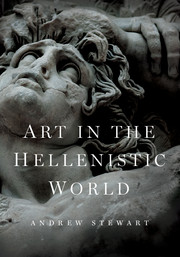Book contents
- Frontmatter
- Contents
- List of Illustrations
- Preface
- Introduction
- 1 Settlement
- 2 Power
- 3 Victory
- 4 Benefaction
- Focus I The Great Altar of Pergamon
- 5 Prowess
- 6 Wisdom
- 7 Piety
- 8 Desire
- Focus II Hellenistic Mosaics
- Appendix A The Artist
- Appendix B Kallixeinos of Rhodes on the Wonders of Alexandria
- Glossary
- Timeline
- Biographical Sketches
- Select Bibliography and Further Reading
- References
- Sources of Illustrations
- Index
7 - Piety
Published online by Cambridge University Press: 05 October 2014
- Frontmatter
- Contents
- List of Illustrations
- Preface
- Introduction
- 1 Settlement
- 2 Power
- 3 Victory
- 4 Benefaction
- Focus I The Great Altar of Pergamon
- 5 Prowess
- 6 Wisdom
- 7 Piety
- 8 Desire
- Focus II Hellenistic Mosaics
- Appendix A The Artist
- Appendix B Kallixeinos of Rhodes on the Wonders of Alexandria
- Glossary
- Timeline
- Biographical Sketches
- Select Bibliography and Further Reading
- References
- Sources of Illustrations
- Index
Summary
Although the Greeks had always prided themselves on their piety (eusebeia), by the Hellenistic period many of them would have viewed the Olympian gods somewhat differently from their predecessors.
To begin with, some radicals had long maintained that the stories of the poets (Homer, Figure 74, and Hesiod, in particular) were fictions, for they were clearly blasphemous and self-contradictory. Reason dictated that gods do not fornicate or lie; imprison or fight each other; commit adultery; or die. Discontent increased during the fifth century, when the attacks of the Sophists – those itinerant, rationalist, and often agnostic freethinkers and teachers – began to sharpen and strike home.
In Euripides’ Iphigeneia among the Taurians, for example, the heroine declares that Artemis could never demand human sacrifice, as the Taurians believed, for the goddess of purity could not be hypocritical or evil. And in his Herakles, the hero states flatly:
I don’t believe the gods condone unlawful love.
Those bondage stories are unworthy, too.
I can’t accept them; nor that any god
Is tyrant of another. A true god
Needs nothing. Those are poets’ stupid myths.
These remarks not only anticipate Epikouros’s beliefs, discussed in Chapter 6, by a century; they also demolish Greek tragedy’s very foundations, and even – with typical Euripidean irony – Herakles’ own existence. (He was the uncrowned king of bondage.)
- Type
- Chapter
- Information
- Art in the Hellenistic WorldAn Introduction, pp. 154 - 176Publisher: Cambridge University PressPrint publication year: 2014



